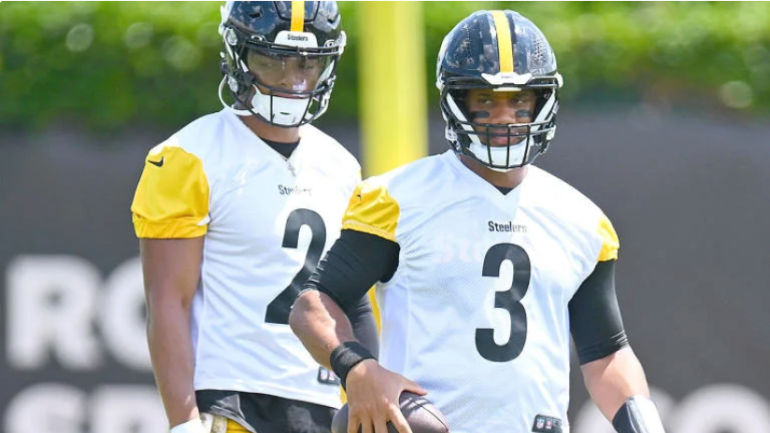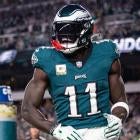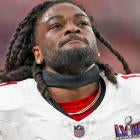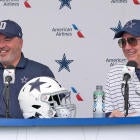
The 2024 NFL offseason is in full effect as the league welcomes a gap between the talent acquisition portion of the calendar and the start of training camp. Determining who's had the best offseason is not as simple as predicting which teams will be competing for a Super Bowl at the end of the upcoming season. Teams have different objectives and, for some, that entails a postseason appearance -- even if it ends early.
It has been a busy few months as talent evaluators and roster managers have done their best to construct a roster capable of improving upon last season's results. Here are the 10 teams that have enjoyed the best offseason:
1. Chicago Bears
General manager Ryan Poles did a fantastic job of addressing the present without sacrificing the future. Caleb Williams is the face of the franchise and the organization did everything in its power to surround him with the talent necessary for him to find success early in his career. A No. 1 overall selection may have never stepped into a situation as good as the one Williams has in the Windy City. His collection of pass catchers includes wide receivers D.J. Moore, Keenan Allen and Rome Odunze, as well as tight end Cole Kmet. They also added veteran D'Andre Swift as another playmaker in the backfield.
The defense showed a lot of growth during the second half of the season, but fans should be realistic with expectations. It is a unit that still has starter and depth concerns.
2. Arizona Cardinals
Arizona did a good job of accumulating talent without compromising the future. The Cardinals were in a position to draft No. 4 overall for a reason and it was time for them to add foundational pieces. Marvin Harrison Jr. is an effective outlet for quarterback Kyler Murray. They also addressed other positions of need like the defensive line and secondary without spending big in free agency and over-leveraging the franchise's financial position. As they create a more stable environment, the Cardinals will be in a better position to spend big on the right players in the coming years.
3. Pittsburgh Steelers
First and foremost, moving on from offensive coordinator Matt Canada in favor of Arthur Smith is an upgrade. By signing Russell Wilson and trading for Justin Fields, the organization leaned into its run-based identity. The offensive line draft selections give the Steelers an opportunity to take a big stride forward in that department this season. Pittsburgh used its first two draft choices on left tackle Troy Fautanu and center Zach Frazier.
The defense was relatively untouched, but that is not a problem considering its strength when healthy. The selection of NC State linebacker Payton Wilson in the third round represented good value.
4. Houston Texans
Houston was fortunate to retain its coaching staff through the head coach hiring process. Offensive coordinator Bobby Slowik did a great job in his first season and now has the luxury of fine-tuning the operation with C.J. Stroud. The Texans were a surprise entrant into last season's playoffs, which likely accelerated the contention timeline. The moves they made this offseason to add verified difference-makers like running back Joe Mixon and wide receiver Stefon Diggs was smart to capitalize on their window.
On defense, they added veteran pass rusher Danielle Hunter to pair with Will Anderson Jr.
5. Philadelphia Eagles
It could be argued that Philadelphia overpaid a few of the offensive linemen who received extensions this offseason, but continuity is important along the offensive line. The signing of a top tier running back would normally be criticized, but Saquon Barkley was a missing piece to a Super Bowl-contending roster. The draft selections of Quinyon Mitchell and Cooper DeJean gives the defense insurance in the event that either James Bradberry and/or Darius Slay falter.
There was also a clear emphasis on adding coaches with experience in the coordinator roles. Vic Fangio and Kellen Moore check that box as Philadelphia hopes to return to postseason glory.
6. Los Angeles Rams
Los Angeles was not in the best financial spot entering the offseason and the retirement of future Pro Football Hall of Fame inductee Aaron Donald will be felt this season. However, the Donald decision was out of Los Angeles' hands. The response of general manager Les Snead was admirable, though. It was savvy to continue fortifying the offensive line with the signing of bargain trade acquisition Kevin Dotson and the signing of offensive guard Jonah Jackson. To account for Donald's departure, the Rams selected defensive linemen with their first two selections: Florida State edge rusher Jared Verse and Florida State defensive tackle Braden Fiske.
7. New England Patriots
It was an offseason of transition for the Patriots as head coach Jerod Mayo replaced Bill Belichick. The organization has done well to retain its impactful players, such as Christian Barmore, Kyle Dugger, Mike Onwenu and Josh Uche, at a reasonable cost. New England embraced the page turn with the selection of North Carolina quarterback Drake Maye. It prepared for that selection with the signing of veteran Jacoby Brissett.
It will be interesting to see how the hiring of offensive coordinator Alex Van Pelt plays out, but the rest of the team's moves make sense.
8. Washington Commanders
A lot rests on the shoulders of new offensive coordinator Kliff Kingsbury. If he can put Daniels in a position to succeed, then Washington may be starting down a quick turnaround. The hiring of head coach Dan Quinn was not splashy, but it should at least bring a clear vision and stability to the organization. Free agency was spent filling holes with experienced, relatively inexpensive players familiar with Quinn's coaching style. By building out that depth, they allowed themselves to be more flexible in the 2024 NFL Draft.
Jayden Daniels was the crown jewel, but they made quality additions on the defensive side of the ball with tackle Johnny Newton, cornerback Mike Sainristil and others.
9. Tennessee Titans
Tennessee's plan for the offseason was clear: Build around second-year quarterback Will Levis. The team signed center Lloyd Cushenberry and wide receiver Calvin Ridley, then drafted left tackle JC Latham. The cost to sign Ridley was a bit exorbitant, but the reasoning was understood. The trade and extension for L'Jarius Sneed is risky because that is a volatile position year-over-year. Sneed was sensational a year ago, but will he be able to reproduce in a way that justifies the contract?
Hiring Bill Callahan as offensive line coach is as valuable as any assistant coaching change this offseason.
10. Detroit Lions
Detroit retained the heart of its offense with extensions for quarterback Jared Goff, wide receiver Amon-Ra. St. Brown and offensive tackle Penei Sewell. The organization identified the defense as a point of emphasis heading into the offseason and quickly addressed those needs with the signings of edge rusher Marcus Davenport, defensive tackle D.J. Reader and the trade for veteran cornerback Carlton Davis. The Lions then doubled down on the secondary with the draft choices of Terrion Arnold and Ennis Rakestraw Jr.
It was a massive win in the name of continuity when offensive coordinator Ben Johnson turned down head-coaching opportunities to remain in his current role.
The Browns, Bengals and Giants had also been considered for the final spots.


















